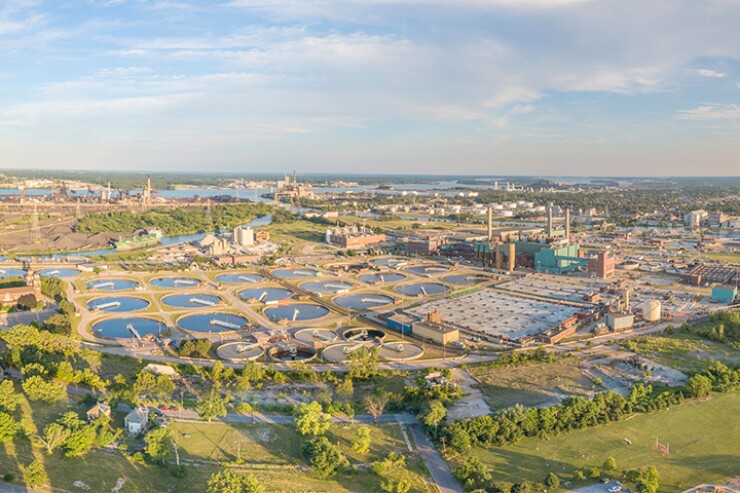The Michigan-based Great Lakes Water Authority returns to the market Tuesday with $205 million of water revenue bonds and $209 million of sewage system revenue bonds burnishing two new positive outlooks.
GLWA — which was
Siebert Williams Shank and Goldman Sachs are senior managers. PFM Financial Advisors LLC is advising and Dickinson Wright Pllc is bond counsel.

The authority's rating trajectory remains on the upswing although it has slowed after upgrades in 2020.
GLWA drew new positive outlooks from Moody's Investors Service on both water and sewer systems while Fitch Ratings raised the outlook on the sewer bonds to positive while holding the water bond outlook steady at stable.
"The outlook is positive because the authority has strong management and stable operations and its underlying service area continues improve, particularly in the city of Detroit, as well as across Wayne County, Oakland, and Macomb counties," said Moody's, which rates the senior lien bonds A1 and the second lien A2.
"The finances and ratings are on a positive trajectory, but ongoing surveillance will be important for bondholders," CreditSights' John Ceffalio, senior municipal research analyst, and Patrick Luby, senior municipal strategist, said in a weekly new issue report.
"The bonds should be a core holding in most portfolios, particularly for Michigan residents, but we'd like see bonds come a bit wide than current plus 55 basis point [spread to AAA indexes] in 10 year levels," CreditSights said. "Due to the complexity of the credit, slow regional growth, and the exposure to the recovery city of Detroit, we still see the credit as one that carries a bit more risk than typical large water and sewer wholesalers."
Fitch affirmed its A-plus and A ratings on the senior and second liens, respectively.
S&P Global Ratings affirmed the senior lien's AA-minus rating and A-plus second lien and stable outlook. The sale will boost overall debt to $1.6 billion of senior lien and $700 million of second lien water and $1.8 billion of senior lien and $800 million of second lien sewer bonds outstanding.
The new money will pay for water treatment and transmission projects, wastewater treatment, interceptor system, and pump station improvements and to reduce combined sewer overflows with capital projects influenced by heavy rain events. The water system has a five-year $966 million capital program and the sewer system totals $762 million.
While several fiscal metrics are on the rise or projected to grow, days cash on hand is down but the agency says in its investor roadshow that's due to a longstanding "deliberate management strategy to fund" a big piece of the capital programs with cash to keep debt levels in check, which supports rating goals.
The authority expects to see a "material decline" its legacy pension obligations related to its absorption of Detroit's system. The authority has been on the hook for a $45 million annual contribution under a nine-year agreement that ends next June. That is projected to fall to under $1 million in 2024 based on current actuarial reports but the authority plans to budget $10 million in case the figure rises under future actuarial reports.
GLWA's water enterprise treats water from Lake Huron, Lake St. Clair and the Detroit River and distributes treated water to a service area population of about 3.8 million. The sewer enterprise collects, treats and disposes of wastewater produced by a service area population of about 2.8 million.
One pressure point on the sewer credit stems from Highland Park's bad debts that date back a decade arising from the
In May, a Wayne County Circuit Court judge ordered the city to resume payments. The Michigan Court of Appeals agreed this month, saying Highland Park must repay $21 million of debt.
While the authority enjoys independent rate-setting authority, member communities recently publicly pushed back against a rate increase driven by Highland Park's unpaid debts.
"This is unlikely to instigate future rate disputes and ultimately resulted in the city of Highland Park beginning to make sewer payments again," Moody's said.
GLWA also stresses that while bad debt expenses are initially passed on to other customers, it will reimburse that expense as it works to recover the debt.
S&P also warns of the downsides of an economic slide. Detroit's recovering employment base remains weak and worsening national economic condition from inflation and higher interest rates "could weaken GLWA's capital and operating budget, potentially pressuring water rates," S&P said.
Detroit accounts for about 25% of the water system's operating revenues followed by Southeast Oakland County Water Authority at 6%, North Oakland County Water Authority at 5%, and Sterling Heights at 4%.
Detroit accounts for about 50% the sewer system's operating revenues followed by Oakland-Macomb Interceptor Drainage District at 12%, Wayne County's Rouge Valley at 10%, and Oakland County's George Kuhn Drainage District at 8%.





